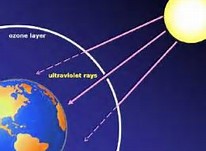Ozone heating Earth more than previously thought: Study

- Country:
- United Kingdom
The ozone layer may be heating the Earth's atmosphere more than previously thought by weakening one of our planet's most important cooling mechanisms, according to a study.
The researchers found that changes to ozone levels in the upper and lower atmosphere were responsible for almost a third of the warming seen in ocean waters bordering Antarctica in the second half of the twentieth century.
The deep and rapid warming in the Southern Ocean affects its role as one of the main regions for soaking up excess heat as the planet warms, they said.
The study, published in the journal Nature Climate Change, found that the majority of this warming was the result of ozone increases in the lower atmosphere.
Ozone -- one of the main components of smog -- is already hazardous as a pollutant, but the latest research shows it may also play a significant role in driving climate change in the coming years.
''Ozone close to Earth's surface is harmful to people and the environment, but this study reveals it also has a big impact on the ocean's ability to absorb excess heat from the atmosphere,'' said Michaela Hegglin, an associate professor at University of Reading in the UK.
''These findings are an eye-opener and hammer home the importance of regulating air pollution to prevent increased ozone levels and global temperatures rising further still,'' Hegglin, one of the study's authors, said.
The team led by researchers at the University of California Riverside, US, used models to simulate changes in ozone levels in the upper and lower atmosphere between 1955 and 2000.
These simulations showed that a decrease in ozone in the upper atmosphere and increase in the lower atmosphere both contributed to warming seen in the upper two kilometres (km) of the ocean waters in the high latitudes by overall greenhouse gas increases.
They also show that the increased ozone in the lower atmosphere caused 60 percent of the overall ozone-induced warming seen in the Southern Ocean over the period studied -- far more than previously thought.
This, the researchers said, was surprising because tropospheric ozone increases are mainly thought of as a climate forcing in the Northern hemisphere since that is where the main pollution occurs.
The ozone layer is vital as it filters dangerous ultraviolet radiation from reaching Earth's surface.
''We have known for a while that ozone depletion high in the atmosphere has affected surface climate in the Southern Hemisphere,” Hegglin said.
''Our research has shown that ozone increases in the lower atmosphere due to air pollution, which occurs primarily in the Northern Hemisphere and 'leaks' into the Southern Hemisphere, is a serious problem as well,'' the researcher added.
(This story has not been edited by Devdiscourse staff and is auto-generated from a syndicated feed.)
ALSO READ
China Eases Rare-Earth Export Controls Amid Global Pressure
China's Rare-Earth Magnet Surge: A Post-Agreement Export Boom
Earthquake Strikes Near Hualien: Island's Seismic Activity Highlighted
Seismic Jolt: Afghan Earthquake Rattles Hindu Kush
India's Quest for Resource Independence: Unlocking Domestic Rare Earths










